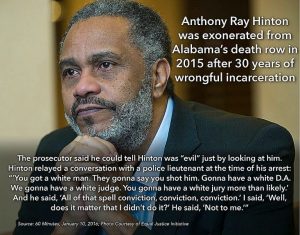
Page Description
Discover Anthony Ray Hinton’s
story of wrongful conviction and 30 years on death row in Alabama,
and his eventual exoneration
and quest for justice.
“Injustice doesn’t just rob someone of their freedom—it robs them of their humanity.”
When Anthony Ray Hinton was wrongfully arrested and convicted for crimes he did not commit, the truth didn’t matter. Despite his unwavering declarations of innocence, he was subjected to a system that chose to ignore the evidence and instead, relied on flawed forensic evidence to imprison an innocent man for nearly three decades. The words spoken to him—“I don’t care what you did or didn’t do…”—echoed the indifference of a system more interested in closing cases than in seeking justice. Hinton’s story is not just one of personal suffering, but of the larger, painful truth about how easily the truth can be obscured by bias, negligence, and a failure to uphold the principles of fairness and accountability.
“Onrecht ontneemt iemand niet alleen zijn vrijheid – het ontneemt hem zijn menselijkheid.”
Toen Anthony Ray Hinton onterecht werd gearresteerd en veroordeeld voor misdaden die hij niet had begaan, deed de waarheid er niet toe. Ondanks zijn onverzettelijke verklaringen van onschuld werd hij onderworpen aan een systeem dat ervoor koos het bewijs te negeren en in plaats daarvan vertrouwt op gebrekkig forensisch bewijs om een onschuldige man bijna drie decennia lang gevangen te houden. De woorden die tegen hem werden gezegd – “Het maakt niet uit wat je wel of niet hebt gedaan…” – weerspiegelden de onverschilligheid van een systeem dat meer geïnteresseerd was in het afsluiten van zaken dan in het zoeken naar gerechtigheid. Het verhaal van Hinton is niet alleen een verhaal van persoonlijk lijden, maar ook van de grotere, pijnlijke waarheid over hoe gemakkelijk de waarheid kan worden vertroebeld door vooroordelen, nalatigheid en een falen om de principes van eerlijkheid en verantwoordelijkheid te handhaven.
Anthony Ray Hinton was wrongfully convicted of two counts of capital murder in 1985 in Alabama and spent 30 years on death row before being exonerated in 2015. Here are some key points about his case:
- Hinton was convicted based on flawed ballistics evidence. The prosecution claimed that bullets found at the crime scene were fired from a gun owned by Hinton. However, the ballistics expert who testified at Hinton’s trial was later found to have used faulty science and unreliable methods in his analysis.
- Hinton had a poor defence. Hinton’s court-appointed attorney did not have the resources to hire a competent ballistics expert to challenge the prosecution’s evidence, and Hinton’s alibi witnesses were not properly investigated or presented at trial.
- Hinton maintained his innocence throughout his imprisonment. Despite facing the death penalty, Hinton refused to confess to the crimes and maintained that he was innocent.
- Hinton’s case received national attention and was championed by civil rights advocates, including Bryan Stevenson of the Equal Justice Initiative.
- Hinton was eventually exonerated in 2015 after the U.S. Supreme Court ruled that he had the right to a new trial with a competent ballistics expert. The prosecution ultimately dropped the charges against Hinton after the new ballistics expert concluded that the bullets could not be matched to Hinton’s gun.
- Hinton’s case highlights the flaws in the criminal justice system, particularly in the use of faulty forensic evidence and the inadequate defence provided to many defendants, particularly those who are poor and Black.
1 – 30 Years in Prison For A Crime He Didn’t Commit | Anthony Ray Hinton | Goalcast
22 nov. 2020
2 Compensation for Hinton’s wrongful conviction
3 Ralph Inbar Bananasplit Shören Lerby
27 jul. 2012
4 Car Chases Pedestrians Prank
31 mei 2012